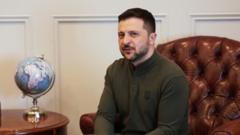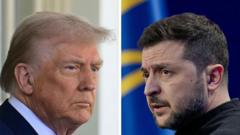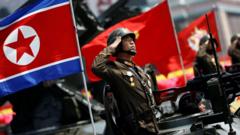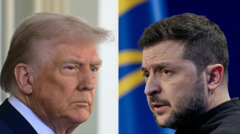Merz's assertive stance marks a significant shift towards a more independent European defense strategy while acknowledging growing public concerns about security.
**A New Era in Germany: Merz's Bold Vision for European Defense**
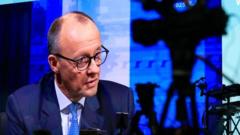
**A New Era in Germany: Merz's Bold Vision for European Defense**
In the wake of elections, Friedrich Merz calls for Europe to strengthen its defenses amid changing relations with the US and Russia.
Germany's chancellor-in-waiting Friedrich Merz declared a transformative shift in European politics, advocating for a reassessment of transatlantic ties even before the election results were finalized. He criticized the US for a perceived detachment from European security matters and urged Europe to ramp up its defense mechanisms quickly, emphasizing the dual threat posed by both the US and Russia.
This new stance from Merz contrasts sharply with the previous administration's approach and reflects a dramatic shift in attitudes towards NATO's future. Merz highlighted the urgency of Europe's security, as the political landscape was shaken by fears of isolation and instability intensified by the rhetoric from the Trump administration, which cast doubt over longstanding security assurances from the US.
Expressing a sense of urgency, Merz articulated a "fear of missing out" on pivotal conversations, notably as the UK Prime Minister and French President independently engage with Washington, urging Germany to reclaim its influential role among Europe’s power trio alongside France and the UK.
While acknowledging the historic alliance with the US, Merz is cautious about sending soldiers to Ukraine, preferring to maintain a supply of military aid, which positions Germany as the second-largest donor after the US. His cautious approach is partly influenced by domestic voters, many of whom feel precarious about Germany’s military involvement abroad while grappling with insecurities posed by Russia’s military activities.
In light of these developments, German voters have increasingly emphasized security in Europe as a pressing concern, stirring discussions around the future of the 35,000 American troops stationed in Germany. The current sentiment paints a picture of urgency and potential instability, as prompted by rising far-right sentiments advocating for a more inward-focused German policy.
Amid worries about Europe falling prey to external threats, Merz has floated the possibility of forging a nuclear collaboration with France and the UK, paving the way for a European nuclear shield. However, the practical feasibility of this idea hinges on complex negotiations tied to military capabilities and political commitments.
Despite the surge in public discourse around defense, Merz faces immense challenges ahead: securing funding for defense initiatives in a weakened economy, negotiating coalitions for governance, and rallying broader European cooperation. The trajectory of Germany's leadership may be poised for renewal, yet the consensus across Europe remains uncertain as the nation contemplates its next moves on the global stage.
This new stance from Merz contrasts sharply with the previous administration's approach and reflects a dramatic shift in attitudes towards NATO's future. Merz highlighted the urgency of Europe's security, as the political landscape was shaken by fears of isolation and instability intensified by the rhetoric from the Trump administration, which cast doubt over longstanding security assurances from the US.
Expressing a sense of urgency, Merz articulated a "fear of missing out" on pivotal conversations, notably as the UK Prime Minister and French President independently engage with Washington, urging Germany to reclaim its influential role among Europe’s power trio alongside France and the UK.
While acknowledging the historic alliance with the US, Merz is cautious about sending soldiers to Ukraine, preferring to maintain a supply of military aid, which positions Germany as the second-largest donor after the US. His cautious approach is partly influenced by domestic voters, many of whom feel precarious about Germany’s military involvement abroad while grappling with insecurities posed by Russia’s military activities.
In light of these developments, German voters have increasingly emphasized security in Europe as a pressing concern, stirring discussions around the future of the 35,000 American troops stationed in Germany. The current sentiment paints a picture of urgency and potential instability, as prompted by rising far-right sentiments advocating for a more inward-focused German policy.
Amid worries about Europe falling prey to external threats, Merz has floated the possibility of forging a nuclear collaboration with France and the UK, paving the way for a European nuclear shield. However, the practical feasibility of this idea hinges on complex negotiations tied to military capabilities and political commitments.
Despite the surge in public discourse around defense, Merz faces immense challenges ahead: securing funding for defense initiatives in a weakened economy, negotiating coalitions for governance, and rallying broader European cooperation. The trajectory of Germany's leadership may be poised for renewal, yet the consensus across Europe remains uncertain as the nation contemplates its next moves on the global stage.





